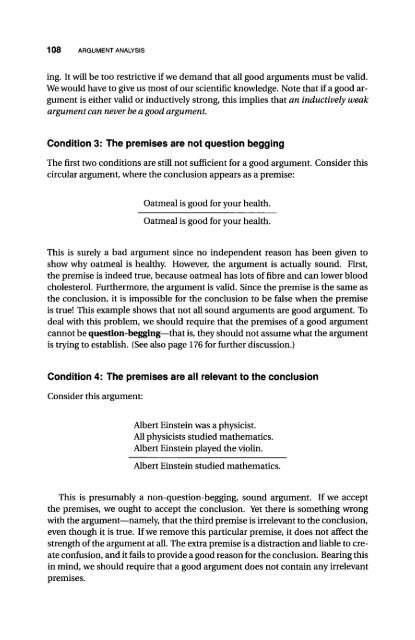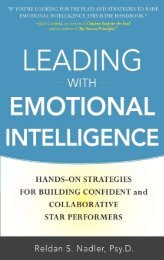An Introduction to Critical Thinking and Creativity - always yours
An Introduction to Critical Thinking and Creativity - always yours
An Introduction to Critical Thinking and Creativity - always yours
You also want an ePaper? Increase the reach of your titles
YUMPU automatically turns print PDFs into web optimized ePapers that Google loves.
108 ARGUMENT ANALYSIS<br />
ing. It will be <strong>to</strong>o restrictive if we dem<strong>and</strong> that all good arguments must be valid.<br />
We would have <strong>to</strong> give us most of our scientific knowledge. Note that if a good argument<br />
is either valid or inductively strong, this implies that an inductively weak<br />
argument can never be a good argument.<br />
Condition 3: The premises are not question begging<br />
The first two conditions are still not sufficient for a good argument. Consider this<br />
circular argument, where the conclusion appears as a premise:<br />
Oatmeal is good for your health.<br />
Oatmeal is good for your health.<br />
This is surely a bad argument since no independent reason has been given <strong>to</strong><br />
show why oatmeal is healthy. However, the argument is actually sound. First,<br />
the premise is indeed true, because oatmeal has lots of fibre <strong>and</strong> can lower blood<br />
cholesterol. Furthermore, the argument is valid. Since the premise is the same as<br />
the conclusion, it is impossible for the conclusion <strong>to</strong> be false when the premise<br />
is true! This example shows that not all sound arguments are good argument. To<br />
deal with this problem, we should require that the premises of a good argument<br />
cannot be question-begging—that is, they should not assume what the argument<br />
is trying <strong>to</strong> establish. (See also page 176 for further discussion.)<br />
Condition 4: The premises are all relevant <strong>to</strong> the conclusion<br />
Consider this argument:<br />
Albert Einstein was a physicist.<br />
All physicists studied mathematics.<br />
Albert Einstein played the violin.<br />
Albert Einstein studied mathematics.<br />
This is presumably a non-question-begging, sound argument. If we accept<br />
the premises, we ought <strong>to</strong> accept the conclusion. Yet there is something wrong<br />
with the argument—namely, that the third premise is irrelevant <strong>to</strong> the conclusion,<br />
even though it is true. If we remove this particular premise, it does not affect the<br />
strength of the argument at all. The extra premise is a distraction <strong>and</strong> liable <strong>to</strong> create<br />
confusion, <strong>and</strong> it fails <strong>to</strong> provide a good reason for the conclusion. Bearing this<br />
in mind, we should require that a good argument does not contain any irrelevant<br />
premises.
















